
What Will The Department of State Become?
The State Department issued the report on an internal “listening survey” on July 5. The report is not public, but reports indicate that its first recommendation is to define a mission for the Department of State. It also addresses a host of other concerns, and current and past State personnel complain that the Department is being gutted, among other things. But the Department has had no continuity in its mission since the Cold War. In and of itself, the “Listening Report’s” first recommendation addresses the key question of U.S. diplomacy and foreign relations.
With the fall of the Soviet Union, tight cohesion around Containment gave way to issue-by-issue policy-making. Without that doctrine, FSOs became subject to office-chiefs’ parochial priorities, and their stances would inevitably contradict each others’ — and their previous work as they moved from post to post. Today not even the anti-terrorism mission gives clear guidance.
There are two special challenges to setting a State mission. First, today any person in the world might be the next hacker, dictator, suicide bomber – inventor or artist. Second, the definition of diplomacy, the Department’s expected expertise, analogous to Defense’s in the use of arms, is itself indistinct. State needs a clear function, in which it can even reach individuals, through today’s chaotic world.
A U.S. foreign policy mission will only endure if it rests on a nuanced knowledge of the tenets, nuances, and implications (including philosophical, political, and strategic) of our Declaration of Independence. This specialized knowledge should lie at the heart of a common professional identity, personally held by each U.S. diplomat. It could be imparted by a single institutional move — to shape new formative training for diplomats.
The Declaration is the base on which diplomacy works for Americans. Training must also provide a common grounding in world affairs disciplines, including military, economic, historical, and cultural, plus exposure to a broad range of American realities. But it now must impart fluency in our founding tenets as the bedrock capacity.
An analysis of the diplomats’ function, extracted from Jeremy Black’s History of Diplomacy, shows diplomats’ performance hinging on an understanding of their leader. To represent their nation, report on trends in their host country, and as needed negotiate or facilitate, they needed to know the person (for most of history, be it monarch or dictator) who embodied the nation. U.S. diplomats need to know 300 million people, all with unalienable rights.
America’s fundamental common feature is our explicit, deliberate founding on principle, which binds us regardless of complexity and disruption. The principle — of unalienable rights and government dedicated to secure them — is abstract and dualistic, so understanding requires reflection as well as recitation. But that passage is the focal point: it forms our founding civic creed. The Constitution, the Federalist Papers, and the Bill of Rights follow it, and refer to its terms. Our history can be seen as revolving around it. It created America’s nationality and defines the basis of our national interest.
Our diplomats must project the narrative of America’s founding creed, to governments and individuals, in all channels of discourse and in our policy formulation. Much as a major league pitcher can snap off a curveball or slider as needed, diplomats will need a mental “muscle memory,” to discuss, in direct response on any given case, how our principles apply, why they are valid, or how they benefit humanity. Diplomats who have internalized our narrative as professional reflex can voice and shape policy in its spirit, to set others’ perceptions by our lights.
Infusing this expertise in diplomats’ formative training will push it down to the lowest levels. The junior officer will have the same compass as an ambassador, so even improvised responses to unexpected issues will naturally fit our grand interest. Each diplomat will likewise share an innate sense of the essentials for reporting to Washington. In inter-agency processes, State representatives will be equipped to voice and apply America’s fundamental values for any policy decision.
Steeping our diplomats in our founding creed, and simultaneously imparting topical skills, will marry policy knowledge with America’s nature in a professional cadre. Such operational norms could give Americans comfort that our foreign policy reflects our nature. All Americans, whether they study the creed or not, share its values, so a mission based on it will respect any electoral mandate. State will take on an air of “America’s Desk,” our experts in the national interest.
Such a conception of U.S. diplomacy, carried by the diplomats themselves, would give clear orientation for policy and institutional arrangements.
U.S. foreign policy faces a new era that calls for new policies and practices. George Kennan, facing his own foreboding new era, made an observation I still find relevant: To survive, he said, the United States “need only measure up to its own best traditions.” Today, a new State embodying our founding tenets will ensure our best future.